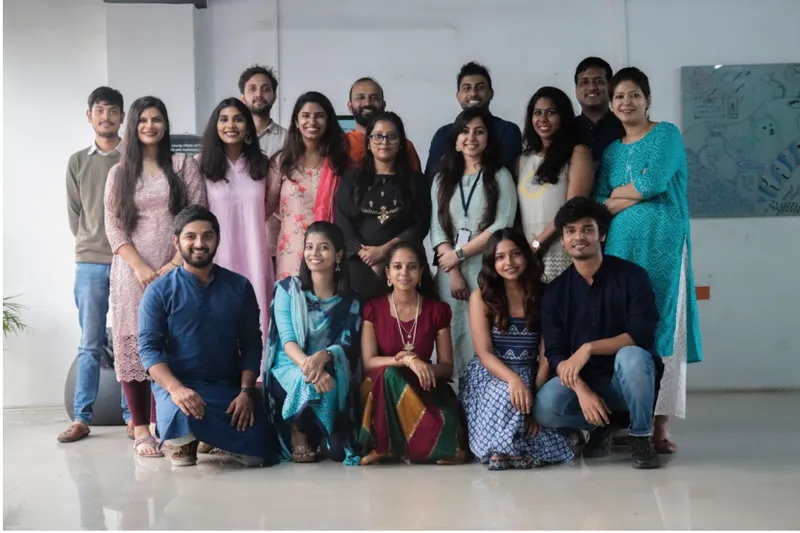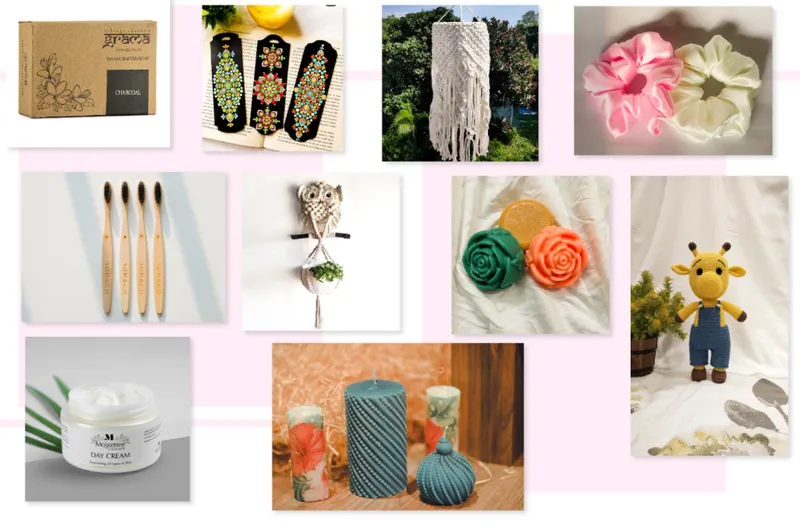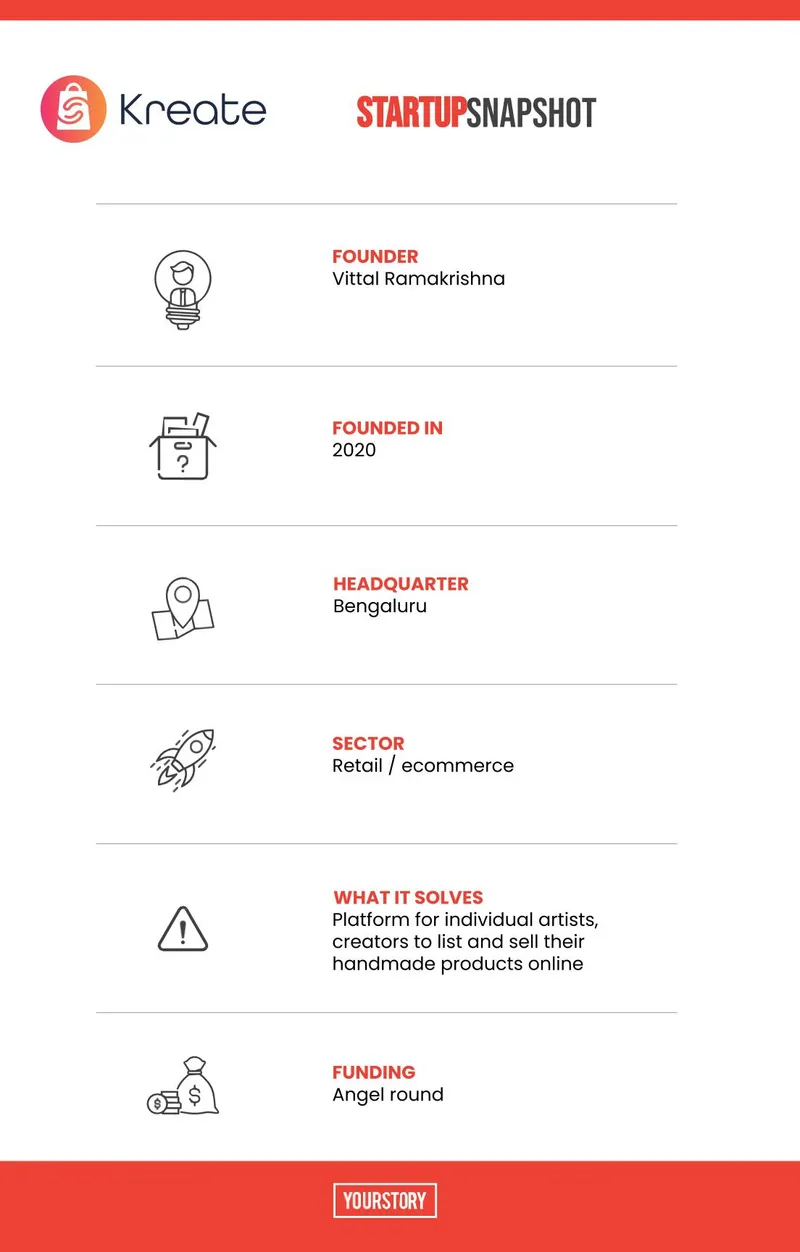How this preselling platform is empowering artists and creators
With over 8000 verified sellers, 20,000+ products and Rs 12.5 crore worth of transactions, Kreate, formerly CrowdPouch, aspires to enlist 50,000+ sellers on its platform by the end of the year 2022.
After spending almost a decade across European countries working in the alternative finance sector, Vittal Ramakrishna, Founder and CEO of CrowdPouch, wanted to come back to his home in India and create an impact.
As luck would have it, while Vittal was rethinking his future plans, he happened to connect with a couple of his friends who were selling personalised artwork and handmade products on Instagram.
That's when he strongly felt that Indian creators could benefit from a dedicated platform to sell customised products.
And that led to the birth of in 2020 — a platform for Indian creators to sell tailor made products.
Recently the Bengaluru-based preselling platform has rebranded itself to Kreate.
Preselling is a concept of online sales where creators display products that they can make but don't have ready stock. So creators typically make this product once an order is placed by the customer.
Why Kreate?
Millions of small-scale product manufacturers, independent creators, D2C (direct-to-consumer) artists and brands are currently unable to easily access consumers. At the same time, consumers cannot find handmade, organic, and customisable products directly from the creators.
Kreate is solving this problem by offering procurement of products directly from the creators with no third party intervention.

Team Kreate
It provides a platform for individual artists and creators to list and sell their handmade products online. Claimed to be a first-of-its-kind service in India, the platform is open to all and doesn’t require any documentation or registration fee.
“What comes as an added advantage to the sellers on the platform is that Kreate also proactively invests in promoting and marketing products listed on its platform. The products are handmade, homemade, organic and local in every sense of the word. With the wave of #vocalforlocal sweeping the nation, there could not have been a better time for the platform to come to the forefront and showcase the potential of individual creativity and skill,” Vittal tells YourStory.
How Kreate works
Speaking about the startup, Vittal states, “Sellers are onboarded on our platform with an already existing consumer base after a vetting process. Once the products are listed on our platform, buyers can view and purchase them directly through the mobile application. Once a sale is made, the seller then gets notified about the order through communication channels such as SMS and email. The order is then picked up from the seller and delivered to the customer.”
Currently, there are 20,000 products listed in the platform across 6 main categories - personal care; home decor; clothing; food; accessories; gifting.

Range of products available in the platform
Available on Android, the startup soon plans to launch an iOS mobile application.
The platform charges a flat fee of 7 percent as a marketplace commission only after a sale is made through its application.
“There are no other charges but we plan to introduce new revenue streams in the future,” highlights Vittal.
Business model and COVID-19 impact
According to Vittal, the pandemic has had a largely positive impact on Kreate’s business as several consumers entered digital space for the first time.
“We were able to work remotely as we are asset free and hence our operations were smooth. There were challenges within the team including me when we were tested positive for Covid-19 but we were having mild symptoms and were quick to resume work. Our task management is well organised and thus did not impact our way of delivering results,” he adds.

YS Design team
With a team size of 16 members, Vittal takes care of operations, fundraising and strategy.
Market size and revenue
According to Boston Consulting Group (BCG), the Indian retail industry is poised to reach $1 trillion by 2025, a huge jump from the $750 billion market size in 2020.
Another report by Avendus suggests that the country’s D2C business is going to be worth $100 billion in five years.
The startup has so far clocked transactions worth Rs 12.5 crores. In FY 21, the startup generated a revenue of 29 lakhs and aims to clock 8 crore by the end of 2024.
It has over 75,000 customers and over 8,000 sellers on its platform.
Speaking of competition, Vittal says, ETSY and Patreon do fall in their competition subset globally.
“There are a lot of small players in regional geographies. We aim to be a platform for creators at a large scale and would eventually collaborate or acquire the smaller players to gain regional access to their network of consumers,” he adds.
Speaking from a creator's perspective, Subhadra Agarwal of BubbleBeauty said, “I’ve created Bubblebeauty out of my passion for organic soaps. With the help of Kreate, what started as a passion has become a way for me to be financially independent. Kreate offers a personalisation option for my product line, which other platforms do not provide. With its help, I was able to customise the products according to the individual needs of my customers.”
Funding and way ahead
In August 2020, Kreate raised 70 lakhs (about $100,000) in its angel round from Elina Investments. The startup is further in the process of fundraising, Vittal confirmed during his conversation with YourStory.
The company’s immediate plan includes adding over 50,000 sellers to its platform by the end of 2022.
Kreate’s roadmap for the next one year includes conversational e-commerce.
“This will facilitate real-time order placement and real time conversations between the buyer and a seller to bridge the virtual gap that comes with online shopping. In addition, this will further streamline customisation and personalisation requests paving the way for an enhanced buying experience and fruitful selling experience for the best of India's creators,” Vittal signs off.
Edited by Affirunisa Kankudti




![[Funding alert] Procurement startup Prodo raises Rs 3 Cr in pre-seed round led by Titan Capital, LetsVenture](https://images.yourstory.com/cs/2/e641e900925711e9926177f451727da9/CopyofImageTagsEditorialTeamMaster8-1636545551147.jpg?fm=png&auto=format&h=100&w=100&crop=entropy&fit=crop)




